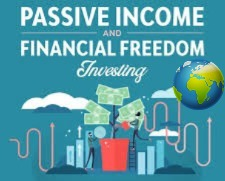101 Ways to Financial Freedom through Passive Income in 2024
### Introduction to Financial Freedom through Passive Income
Achieving financial freedom through passive income is a highly sought-after goal that allows individuals to sustain their desired lifestyle without actively working. Passive income is money earned with little to no daily effort, allowing one to focus on personal passions, hobbies, or other endeavors. This guide explores the concept of financial freedom through passive income, its importance, objectives, and various ways to achieve it.
### Definition and Examples
**Definition**:
- **Financial Freedom**: The state of having sufficient income to cover living expenses without relying on employment or external financial assistance.
- **Passive Income**: Earnings derived from investments, properties, or business activities in which the individual is not actively involved daily.
**Examples of Passive Income**:
1. **Rental Properties**: Earning rent from real estate investments.
2. **Dividend Stocks**: Receiving dividends from stock investments.
3. **Royalties**: Earning from books, music, or patents.
4. **Online Courses**: Generating income from selling educational content online.
5. **Affiliate Marketing**: Earning commissions from promoting products or services.
### Importance of Financial Freedom through Passive Income
Financial freedom through passive income is crucial for several reasons:
1. **Reduced Stress**: Eliminates the anxiety of living paycheck to paycheck.
2. **Increased Security**: Provides a safety net during economic downturns or personal emergencies.
3. **Improved Quality of Life**: Allows more time for family, hobbies, and travel.
4. **Financial Independence**: Reduces dependency on traditional employment.
5. **Flexibility**: Offers the freedom to pursue personal passions and interests.
### Objectives of Achieving Financial Freedom through Passive Income
1. **Stability**: Ensuring a steady flow of income regardless of employment status.
2. **Wealth Accumulation**: Building wealth over time through investments and assets.
3. **Retirement Planning**: Securing a comfortable and financially stable retirement.
4. **Debt Reduction**: Paying off debts to reduce financial liabilities.
5. **Lifestyle Choices**: Enabling the choice to live life on one's own terms.
### Overview of Financial Freedom through Passive Income
Achieving financial freedom through passive income involves:
1. **Investment Strategies**: Investing in assets that generate passive income.
2. **Financial Planning**: Creating a comprehensive financial plan that includes savings, investments, and risk management.
3. **Income Diversification**: Establishing multiple streams of passive income.
4. **Long-Term Vision**: Focusing on long-term financial goals and consistent growth.
5. **Continuous Learning**: Staying informed about new opportunities and financial trends.
### Psychology of Financial Freedom
The journey to financial freedom is not just financial but also psychological. It involves:
1. **Mindset**: Adopting a positive and proactive attitude towards money management.
2. **Discipline**: Sticking to financial plans and budgets.
3. **Patience**: Understanding that achieving financial freedom is a long-term process.
4. **Resilience**: Overcoming setbacks and staying committed to financial goals.
5. **Behavioral Changes**: Adopting habits that support long-term financial success.
### Pros and Cons of Financial Freedom through Passive Income
**Pros**:
1. **Less Stress**: Reduced financial anxiety.
2. **More Free Time**: Ability to pursue personal interests.
3. **Financial Security**: Stable income streams provide financial security.
4. **Early Retirement**: Potential for early retirement.
5. **Flexibility**: Greater flexibility in lifestyle choices.
**Cons**:
1. **Initial Effort**: Requires significant initial effort and investment.
2. **Risk**: Investments and income sources can be risky.
3. **Time to Build**: Passive income streams take time to develop.
4. **Market Fluctuations**: Income can be affected by market changes.
5. **Management**: Some passive income sources require ongoing management.
Achieving financial freedom through passive income means generating a steady flow of income without active, daily involvement. Here are 101 ways to achieve financial freedom through passive income in 2024:
### Real Estate Investments
1. **Rental Properties**: Purchase properties to rent out to tenants.
2. **Real Estate Investment Trusts (REITs)**: Invest in REITs to earn dividends.
3. **Real Estate Crowdfunding**: Participate in real estate crowdfunding platforms.
4. **Vacation Rentals**: Rent out property on platforms like Airbnb.
5. **Commercial Real Estate**: Invest in commercial properties.
6. **House Hacking**: Live in one unit of a multi-unit property and rent out the others.
7. **Land Leasing**: Lease land to farmers or developers.
8. **Mobile Home Parks**: Invest in or develop mobile home parks.
9. **Storage Units**: Invest in self-storage facilities.
10. **Parking Spaces**: Rent out parking spaces in high-demand areas.
### Stock Market Investments
11. **Dividend Stocks**: Invest in stocks that pay regular dividends.
12. **Index Funds**: Invest in index funds for steady growth and dividends.
13. **Exchange-Traded Funds (ETFs)**: Invest in ETFs for diversification and dividends.
14. **Preferred Stocks**: Invest in preferred stocks for higher dividend yields.
15. **High-Yield Bonds**: Invest in bonds with higher interest rates.
16. **Covered Calls**: Generate income by selling covered call options.
17. **DRIP (Dividend Reinvestment Plans)**: Reinvest dividends to compound growth.
18. **Municipal Bonds**: Invest in municipal bonds for tax-free income.
19. **Corporate Bonds**: Invest in corporate bonds for fixed interest income.
20. **Peer-to-Peer Lending**: Earn interest by lending money through P2P platforms.
### Digital and Online Ventures
21. **Affiliate Marketing**: Earn commissions by promoting products or services.
22. **E-Books**: Write and sell e-books on platforms like Amazon Kindle.
23. **Online Courses**: Create and sell online courses.
24. **Blogging**: Monetize a blog through ads and affiliate marketing.
25. **YouTube Channel**: Earn revenue from ads, sponsorships, and merchandise.
26. **Podcasting**: Monetize a podcast through sponsorships and ads.
27. **Stock Photography**: Sell photos on stock photography websites.
28. **Mobile Apps**: Develop and sell mobile applications.
29. **Website Flipping**: Buy, improve, and sell websites.
30. **Dropshipping**: Run an e-commerce store without holding inventory.
### Intellectual Property
31. **Patents**: License patents to companies for royalties.
32. **Trademarks**: License trademarks for brand usage.
33. **Music Royalties**: Earn royalties from music compositions.
34. **Book Royalties**: Receive royalties from published books.
35. **Software Licensing**: License software to other companies.
36. **Art Sales**: Sell or license artwork.
### Investment Funds
37. **Mutual Funds**: Invest in mutual funds for diversified income.
38. **Target-Date Funds**: Invest in target-date funds for retirement income.
39. **Hedge Funds**: Invest in hedge funds for potentially higher returns.
40. **Private Equity Funds**: Invest in private equity for long-term gains.
41. **Annuities**: Purchase annuities for guaranteed income.
42. **Income Funds**: Invest in funds focused on generating income.
### Business Ownership
43. **Silent Partnership**: Invest in businesses as a silent partner.
44. **Franchise Ownership**: Own a franchise and hire managers.
45. **Automated Businesses**: Start or buy businesses that can be automated.
46. **Royalties from Business Ideas**: License business concepts or ideas.
47. **Automated Car Wash**: Invest in an automated car wash business.
48. **Vending Machines**: Own and operate vending machines.
49. **Laundromats**: Invest in self-service laundromats.
### Technology and Innovations
50. **Cryptocurrency Staking**: Stake cryptocurrencies to earn rewards.
51. **Yield Farming**: Provide liquidity to DeFi platforms for returns.
52. **Node Hosting**: Host blockchain nodes for passive income.
53. **Internet of Things (IoT)**: Invest in IoT devices that generate data royalties.
54. **3D Printing**: Sell 3D printed products or designs.
55. **Artificial Intelligence**: Invest in AI technologies that generate income.
### Renewable Energy
56. **Solar Panels**: Install solar panels and sell excess energy.
57. **Wind Turbines**: Invest in wind energy projects.
58. **Hydroelectric Power**: Invest in hydroelectric energy projects.
59. **Bioenergy**: Invest in bioenergy production.
60. **Energy Storage**: Invest in energy storage solutions.
### Agriculture and Natural Resources
61. **Farmland Leasing**: Lease farmland to farmers.
62. **Timber Investments**: Invest in timberland.
63. **Fishing Rights**: Invest in fishing rights for income.
64. **Mineral Rights**: Purchase mineral rights for royalties.
65. **Water Rights**: Invest in water rights.
### Miscellaneous
66. **Peer-to-Peer Car Rental**: Rent out your car on P2P rental platforms.
67. **Boat Rentals**: Rent out boats or yachts.
68. **Equipment Leasing**: Lease equipment to businesses.
69. **Event Space Rentals**: Rent out event spaces for parties and gatherings.
70. **Renting Tools and Machinery**: Rent out tools and machinery.
71. **Luxury Goods Rentals**: Rent out luxury items like designer clothes and accessories.
72. **Bike Rentals**: Rent out bicycles in tourist areas.
73. **ATM Ownership**: Own and operate ATMs.
74. **Arcade Games**: Invest in arcade games and place them in locations.
75. **Rental Furniture**: Rent out furniture to short-term renters.
### Alternative Investments
76. **Collectibles**: Invest in valuable collectibles like coins, stamps, or art.
77. **Wine Investments**: Invest in fine wines for appreciation.
78. **Antiques**: Invest in antiques for resale.
79. **Luxury Watches**: Invest in luxury watches.
80. **Vintage Cars**: Invest in classic cars for appreciation.
### Financial Instruments
81. **Certificates of Deposit (CDs)**: Invest in CDs for fixed interest.
82. **Treasury Securities**: Invest in government securities.
83. **Preferred Shares**: Invest in preferred shares of companies.
84. **Convertible Bonds**: Invest in bonds that can be converted to stock.
### Health and Wellness
85. **Fitness Equipment Rentals**: Rent out fitness equipment.
86. **Health Apps**: Develop and monetize health-related apps.
87. **Nutritional Supplements**: Create and sell nutritional supplements.
### Education and Training
88. **Tutoring Services**: Create and license tutoring programs.
89. **Educational Apps**: Develop and monetize educational apps.
90. **Learning Management Systems (LMS)**: Create and sell LMS software.
### Sustainable Investments
91. **Green Bonds**: Invest in bonds that fund environmental projects.
92. **Sustainable Agriculture**: Invest in sustainable farming practices.
93. **Eco-Friendly Products**: Create and sell eco-friendly products.
### Community and Social Impact
94. **Community Bonds**: Invest in bonds that fund community projects.
95. **Impact Investing**: Invest in companies that generate social or environmental benefits.
96. **Microfinance**: Provide microloans to small businesses.
### Personal Development
97. **Self-Improvement Books**: Write and sell self-improvement books.
98. **Motivational Speaking**: Earn income from speaking engagements.
### Entertainment and Leisure
99. **Board Game Creation**: Develop and sell board games.
100. **Escape Rooms**: Invest in or create escape rooms.
101. **Virtual Reality Experiences**: Develop and monetize VR experiences.
### Summary and Conclusion
**Summary**:
Financial freedom through passive income is about creating a lifestyle where money is not a constant worry. It involves investing in assets that generate income with minimal active involvement, allowing one to focus on personal and professional goals. The journey requires a mix of smart financial strategies, psychological resilience, and continuous learning.
**Conclusion**:
Achieving financial freedom through passive income is a realistic and attainable goal. It provides numerous benefits, including reduced stress, increased financial security, and greater freedom to live life on your terms. While it requires initial effort, planning, and discipline, the long-term rewards make it a worthwhile pursuit. By exploring various passive income opportunities and staying committed to your financial plan, you can attain financial independence and enjoy a more fulfilling life. Achieving financial freedom through passive income involves diversifying income streams, making smart investments, and leveraging technology and resources. By exploring these 101 ways, you can create a robust portfolio of passive income sources, ensuring financial stability and independence in 2024 and beyond.
*Thank you very much for your attention and interest in financial freedom through passive income. I hope this guide provides valuable insights and practical steps to help you on your journey towards achieving financial freedom. With warm gratitude, I wish you success and prosperity.*







